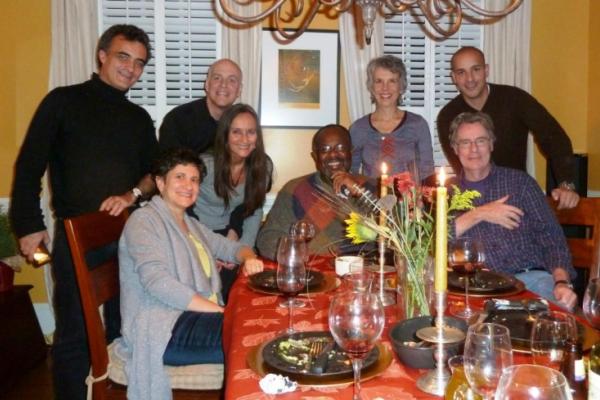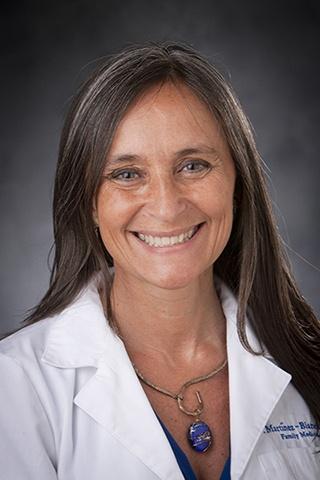
Dr. Martinez-Bianchi hosted a Thanksgiving dinner party for friends and colleagues in 2012.
I did not grow up with Thanksgiving. I “acquired” Thanksgiving as I moved to the United States and decided to live a life mixing my South American and European roots with quintessential North American traditions.

I discovered I could cook once I was already married and living in Iowa, and I applied what I had watched my grandmothers and mom do to our Argentinean turkeys. Mixtures of garlic, sweet onions, chives, pepper and salt would be stuffed in between layers of the turkey’s muscles, Champagne or red wine mixed with salt and olive oil injected under the skin.
The turkey would start in the oven and it would finish its cooking on the gas grill, always with wood burning alongside, adopting the smoky flavor of the wood coal grill I so much missed from my Argentinean upbringing. My Thanksgiving turkeys would come up juicy and tender, flavors mixed in with the meat, smelling like South American holidays; “my” turkeys were a matter of real pride.
One year I ended up on National Public Radio. We were listening to a holiday program inviting callers to describe their Thanksgivings dinner traditions, and a friend insisted that I call to describe the steps I did to prepare my turkey. “They are going to love it,” she coaxed me. At that time, Juan Williams was on the program, and he laughingly asked if he could join us at our Thanksgiving dinner. As my family grew, my husband learned my way to grill turkey and he and our son made it into an even better concoction, the result of family participation.
‘It was about the gratitude of being with family and friends’

zI was never able to understand the idea of turkey stuffing, or gravy. Or figure out why most other people’s turkeys were dry, devoid of color, or what I considered “real flavor,” and it was during that NPR radio program when I heard other callers describe their holiday traditions that it dawned on me: Thanksgiving was not about that stuffing, or the perfect or juiciest turkey. It was about the gratitude of being with family and friends. As I listened in, NPR callers cried as they described how they missed their mom’s thanksgiving, even if they had been served dry turkey. Thanksgiving was and is a time to take a pause, and find gratitude in our hearts.
How do we find gratitude when our world is undergoing a moment of darkness and pain through unjustified destruction and hate, such as with Europe’s refugee crisis, and deadly attacks in Beirut and Paris. How do we feel gratitude in our hearts when we see life around us being cut short by preventable conditions every day? How to feel gratitude when injustice, scare mongering and racism surround us in everyday life, and in the national political discourse? How do we say thanks when we are feeling stressed because our families and friends might be going through a difficult hardship or facing a devastating illness?
As clinicians, how do we maintain gratitude when we feel overwhelmed by demands of an electronic medical record and system seemed to be built to prove that “meaningful use” means “meaningless clicks” (not improving quality, safety, efficiency, and reducing health disparities)? In times of rising expectations of health care practices the “Triple Aim” (better care, better health, and lower costs) develops a fourth dimension and becomes “The Quadruple Aim”: with improving the work life of those who deliver the care.
The Thanksgiving holiday is a reminder of the importance to pause to give thanks and find gratitude in our hearts, even in times of stress.
I am thankful for …
- My family and friends, and seeing my child grow to be an amazing young man.
- The opportunity to work surrounded by outstanding people who put patients at the center of the care we provide.
- Coffee, lovingly prepared by my husband every morning.
- My family’s support during the long hours I dedicate to my work.
- Working with residents who see family medicine as a means toward social justice.
- My patients’ trust.
- The challenges that allow us to grow.
- Those around me with the greatest ability to listen and for those who have the art of words.
- Colleagues all around the world. ¡Viva la Medicina Familiar!
- The writers, the activists, the community organizers.
- Having the ability to connect with people at the best and worst times of their lives.
- Seeing residents grow into outstanding family physicians.
- Duke University’s zillion opportunities to develop ideas, interests and leadership.
- Amazing medical students applying to our program and dreaming of a family medicine revolution. #FMRevolution
- Academies and societies of family medicine
- My roots and to being able to see life from a different perspective.
- Those working around me as members of the residency team, for their patience and their guidance and for believing that we can continue to build an amazing program.
- The opportunities to work together and to create a better future for our communities.
What are you thankful for?
Viviana Martinez-Bianchi is program director of the Duke Family Medicine Residency Program. Email viviana.martinezbianchi@dm.duke.edu with questions.
Editor’s note: A member of the Duke Family Medicine Residency Program leadership team guest blogs every month.
